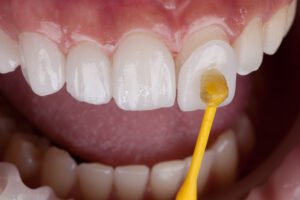An abscessed tooth is a painful dental condition that occurs when a bacterial infection causes a pocket of pus to form in the tooth or gums. This infection is usually the result of untreated tooth decay, gum disease, or a cracked tooth that allows bacteria to enter the inner layers of the tooth.
One of the main causes of an abscessed tooth is poor oral hygiene. When plaque and food particles are not properly removed from the teeth, bacteria can thrive and lead to decay. This decay can eventually reach the inner pulp of the tooth, causing an infection to develop.
Another common cause of an abscessed tooth is gum disease. When the gums become inflamed and pull away from the teeth, pockets can form where bacteria can accumulate and cause an infection. If left untreated, this infection can spread to the tooth and surrounding tissues.
Symptoms of an abscessed tooth include severe toothache, swelling in the face or cheek, fever, and a foul taste in the mouth. If you experience any of these symptoms, it is important to see a dentist as soon as possible for treatment.
Treatment for an abscessed tooth typically involves draining the pus from the abscess and removing the source of the infection. This may require a root canal procedure to remove the infected pulp and seal the tooth, or in severe cases, extraction of the tooth may be necessary.
In addition to dental procedures, antibiotics may be prescribed to help clear the infection and prevent it from spreading. Pain medication and warm saltwater rinses can also help alleviate discomfort and promote healing.
Overall, maintaining good oral hygiene, including regular brushing, flossing, and dental check-ups, is key to preventing an abscessed tooth. If you suspect you have an abscessed tooth, seek prompt treatment to prevent further complications.




